Star Wars: a Criticism of Paternalism as Stepping Stone to Empire

During the week of October 14th, 2019, Trump ordered the withdrawal of U.S. troops from the northern regions of Syria, exposing the U.S. allied Kurds to violence at the hands of Turkish military preparing to storm the borders of Syria. Many Democrats and military analysts are decrying the move as a betrayal of vulnerable U.S. allies and a sign that can possibly taken as cowardice or even complicity with the desires of foreign nations like Syria and Russia. However, a question we must ask ourselves as promoters of human rights whether perpetuating the U.S. role of world police or global “peace keepers” really promotes global democracy or undermines it.
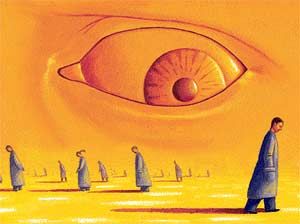 Paternalism is described by John Stuart Mill in 1859 1 as ruling methods or governmental ideologies based on the belief that government should act as a father to the people, preventing them from knowingly or unknowingly harming themselves, thus justifying legislation against “victimless” crimes like drug consumption or riding motorcycles without helmets. Mill’s rejects paternalism on the grounds that:
Paternalism is described by John Stuart Mill in 1859 1 as ruling methods or governmental ideologies based on the belief that government should act as a father to the people, preventing them from knowingly or unknowingly harming themselves, thus justifying legislation against “victimless” crimes like drug consumption or riding motorcycles without helmets. Mill’s rejects paternalism on the grounds that:
“the sole end for which mankind are warranted, individually or collectively, in interfering with the liberty of action of any of their number, is self-protection […] the only purpose for which power can be rightfully exercised over any member of a civilized community, against his will, is to prevent harm to others. His own good, either physical or moral, is not a sufficient warrant. He cannot rightfully be compelled to do or forbear because it will be better for him to do so” (13).
Although at the time, Mill’s argument to restrict government merely to preventing violence between individuals represented an increasing movement towards liberal democracy, this line of reasoning (e.g. getting involved militarily in order to stop violence between groups or nations) has become the justification for U.S. and/or U.N. involvement in foreign affairs. Mill’s attempt at restricting governmental sovereignty now justifies what amounts to imperial interventionism as a foreign policy regardless of which political party sits in the White House.
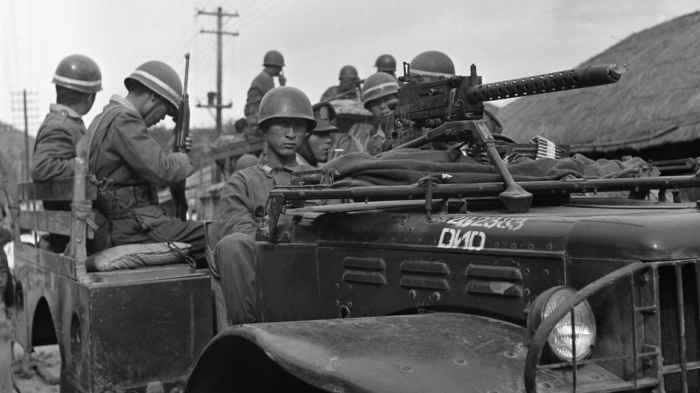
1950 to 1953: the U.S. defends the South Koreans from the Communist Chinese and North Koreans. 1965 to 1973: the U.S. fights the Communist Viet Cong in Vietnam. 1963 to 1973: covert U.S. operations ends up leading to the assassination of Chile’s democratically elected President Allende and installing military dictator General Pinochet. 1992 to 1995: U.N. Peacekeeper Forces found themselves embroiled in the Yugoslav Wars. 1991: U.S. forces drive Iraqi forces from Kuwait. In 2001, the U.S. invaded Afghanistan in response to the 9/11 attacks and Iraq in 2003 as a response to false reports of weapons of mass destruction. 2014: the U.S. gets involved in Syria. 2015: the U.S. gets involved in Saudi Arabia’s conflict with Yemen.
A 2016 study 2 from the University of Maryland tries to justify these 21st century U.S. interventions as more often motivated by humanitarian concern than personal security reasons, in other words, the U.S. has become a global empire motivated by paternalism, or concern for others. Assuming we even bought this argument, the question remains: how democratic can the international community be when the U.S. tries solving all conflicts by military intervention?
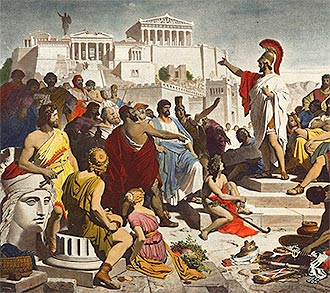
Historically, democratic states fall from within by being corrupted into a tyranny or empire of some kind. As early as 404-403 BCE, ancient Athenian democracy, marred by the corruption and violence characterizing the Thirty Tyrants’ rule, saw five percent of its citizens murdered in its one year. 3 In 31 BCE, the Roman republic transformed by violent military takeover into a theocratic empire under Julius Caesar’s nephew Gaius Octavian Thurinus (Caesar Augustus) and remained so for close to five hundred years. 4 Following the 1933 panic at seeing the Reichstag, the German Parliament building, burn to the ground (allegedly set by a Dutch communist), the Wiemar Republic ended with the appointment of Adolf Hitler as Chancellor and the granting of unparalleled powers to the National-Socialist Party by President Hindenburg’s signing of the Emergency Decree for the Protection of the German People. 5
George Lucas’ Star Wars prequel series of motion pictures shows audiences how fragile a functioning democracy really is, how it always lives under shadowy internal threats of tyrannical empire, often unseen until it is too late. Even the most powerful leaders of the Jedi Council led by Yoda fail to anticipate the loss of democracy to Sheev Palpatine’s (Ian McDiarmid) conspiracy to become Emperor. Yoda exclaims repeatedly how the threat to the future of the Republic cannot be deduced by the clairvoyant and prophetic powers of the Force: “Clouded is the future,” “The dark side clouds everything. Impossible to see the future is,” and other instances throughout the prequel series. It is for this reason that Episode I is titled The Phantom Menace (1999).

The prequel trilogy traces how the Old Republic, driven by the fear of secession, gradually devolving through the increasing reliance on violence into an Empire. Motivated by a fear of losing control over individuals, the Republic declares civil war on the Separatists, building armies and weapons of mass destruction, and removing the rights of people and planets by strengthening the powers of the government under Sheev Palpatine as means of forcing unity. As we learn by Episode III- The Revenge of the Sith, these uses of violence as responses to fear play right into the plans of Sheev Palpatine, aka Darth Sidious, who recognizes how fear and desire make people easy to manipulate. As Yoda perceptively explains to young Anakin at the end of Episode I, “Fear is the path to the dark side. Fear leads to anger. Anger leads to hate. Hate leads to suffering.”
In Star Wars Episode II: the Attack of the Clones (2002), a vibrantly colorized prairie on the planet of Naboo, home to Senator Padme Amidala (Natalie Portman), presents the pastoral, idyllic setting for a conversation between Anakin Skywalker (Hayden Christiansen) and Padme. The vibrant impressionistic backdrop of Naboo stands as a stark opposition to the planet wide urban sprawl of Coruscant, much as Padme’s democratic idealism opposes Anakin’s authoritarian idealism.
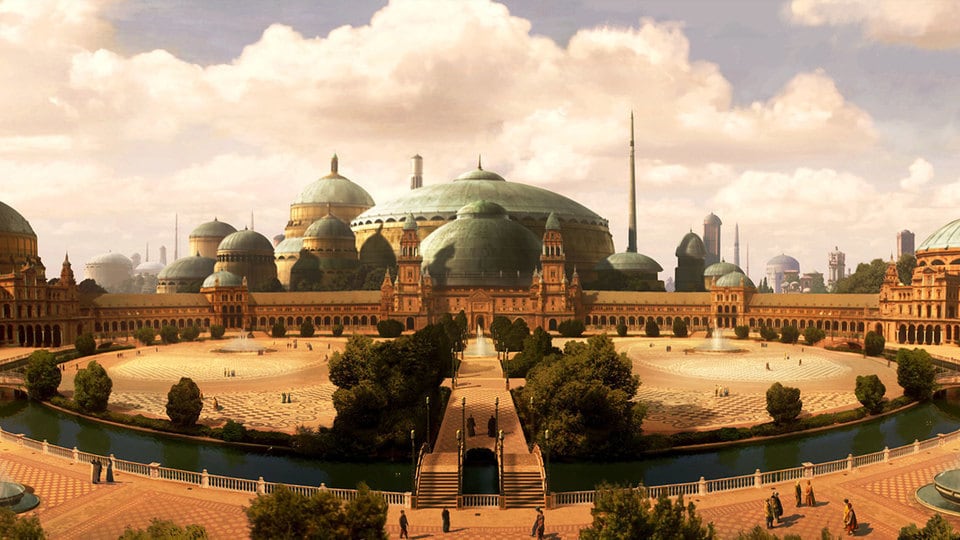
Further, Naboo’s sharp contrast to the metropolitan planet city of Coruscant (the capitol of the Republic in the Star Wars’ prequels and seat of Palpatine’s first democratic then imperial power) immediately invokes Nezar Alsayyad’s essay 6 , which describes how often science fiction movies depict the pastoral or rural as an aesthetic and moral ideal in opposition to cities, shown as places of corruption and sin, an inheritance of the sentiments of early modernity from the 17th through the 19th centuries. Alsayyad writes,
“The issues that these films raise have to be looked upon in the context of Utopian and dystopian ideas about the city and
countryside both in America and Europe. In fact, for many people and cultures particularly in early US history and nineteenth century England, cities were dirty, unhealthy, dangerous and even immoral […] Throughout the nineteenth century the city versus country debate raged, drawing upon the Romantic tradition of the pastoral.” (269-70)

In this picturesque scene on the rolling fields of Naboo, in the early stages of courtship and the prime of their youth, with nothing but their ideals in their hearts and the whole of their untapped futures to look forward to, Ani and Padme try getting to know each other by discussing their political philosophies. Padme’s democratic ideals reflect the pastoral planetscape she hails from even as Anakin’s darker, imperial impulses echo the Machiavellian realpolitik teachings of his new master Palpatine (Darth Sidious), who perfectly matches his dirty, cyberpunk, dystopian surroundings on Coruscant.
It turns out that each represents one half of what Arthur Miller calls the paradox of civilization in his play The Crucible 7 :
“for good purposes, even high purposes, the people […] develop a theocracy, a combine of state and religious power whose function [is] to keep the community together, and to prevent any kind of disunity that might open it to destruction by material or ideological enemies. It [is] forged for a necessary purpose and accomplishe[s] that purpose. But all organization is and must be grounded on the idea of exclusion and prohibition, just as two objects cannot occupy the same space […] a perverse manifestation of panic set[s] in among all classes when the balance beg[ins] to turn toward greater individual freedom.” (4)
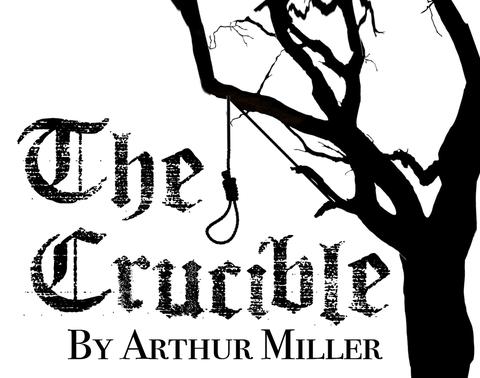
What Miller explains about the Puritans of Salem in the 1690s applies even to a “galaxy far, far away,” any state must find a balance between individual rights, on the one hand, and order/unity on the other. While Padme defends democracy and the rights of individuals in the conversation, she does admit that its greatest difficulty lies in getting people to agree. Anakin, however, doesn’t “think the system works” and that the people who disagree as to how to serve the “best interests of the people […] should be made to […] by someone wise.”
Anakin’s childhood experiences as a slave on the lawless desert planet of Tatooine in the Outer Rim of Star Wars’ galaxy molds him, his traumas presumably pushing him to value order over liberty. However, Anakin’s naïve belief in someone wise enough and good enough to always choose what is best for an entire galaxy is reminiscent of the ancient Greek philosopher Plato’s Philosopher King in his book The Republic (381 BCE) 8 , wherein the philosopher wisely rules as a benevolent tyrant, using his knowledge of all things to maintain peace and harmony among the citizens (369a, 371e, 472e, 451e-466d). Amidala, taken “a bit off guard” challenges him, “That sounds an awful lot like a dictatorship.” But his response of “if it works,” belies the terrible pragmatism (a feeling that results justify methods no matter how immoral they might seem) underlying totalitarian movements and ideologies (philosophies and governments that believe in the use surveillance and violence to forcibly control every aspect of citizens lives).
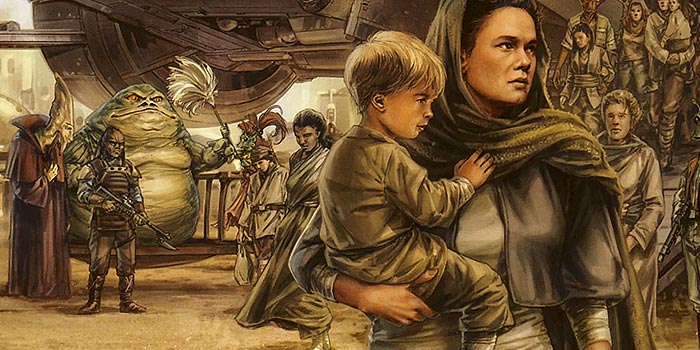
We find another example of imperial analogues to Plato in the Star Wars universe in Star Wars Episode VII- The Force Awakens. Plato’s plans to exile a nation of parents and elders after forcibly kidnapping those under ten years of age (540e-541a) parallel the practice of the First Order in shanghaiing (kidnapping and forcing to serve) human children across the galaxy in order to brainwash and train them as Storm Troopers in Star Wars Episode VII- the Force Awakens.
By the end of the prequel trilogy, however, Star Wars Episode III- The Revenge of the Sith exposes the egoism, fear, greed, and rage underlying Anakin’s (and any empire’s) “pragmatic” methods of fascist expediency “for the best interest of the people” when Padme, representing the very people of a democracy that those in power claim to love and desire to protect, is literally dying at the hands of Anakin, representing the betrayal at the heart of all imperial aspirations. Anakin’s promise to Padme that they can overthrow Palpatine and rule together justly and his slip of the tongue in speaking with Obiwan Kenobi calling the Republic, “My new Empire,” both reveal Anakin Skywalker’s hidden lust for godlike power.
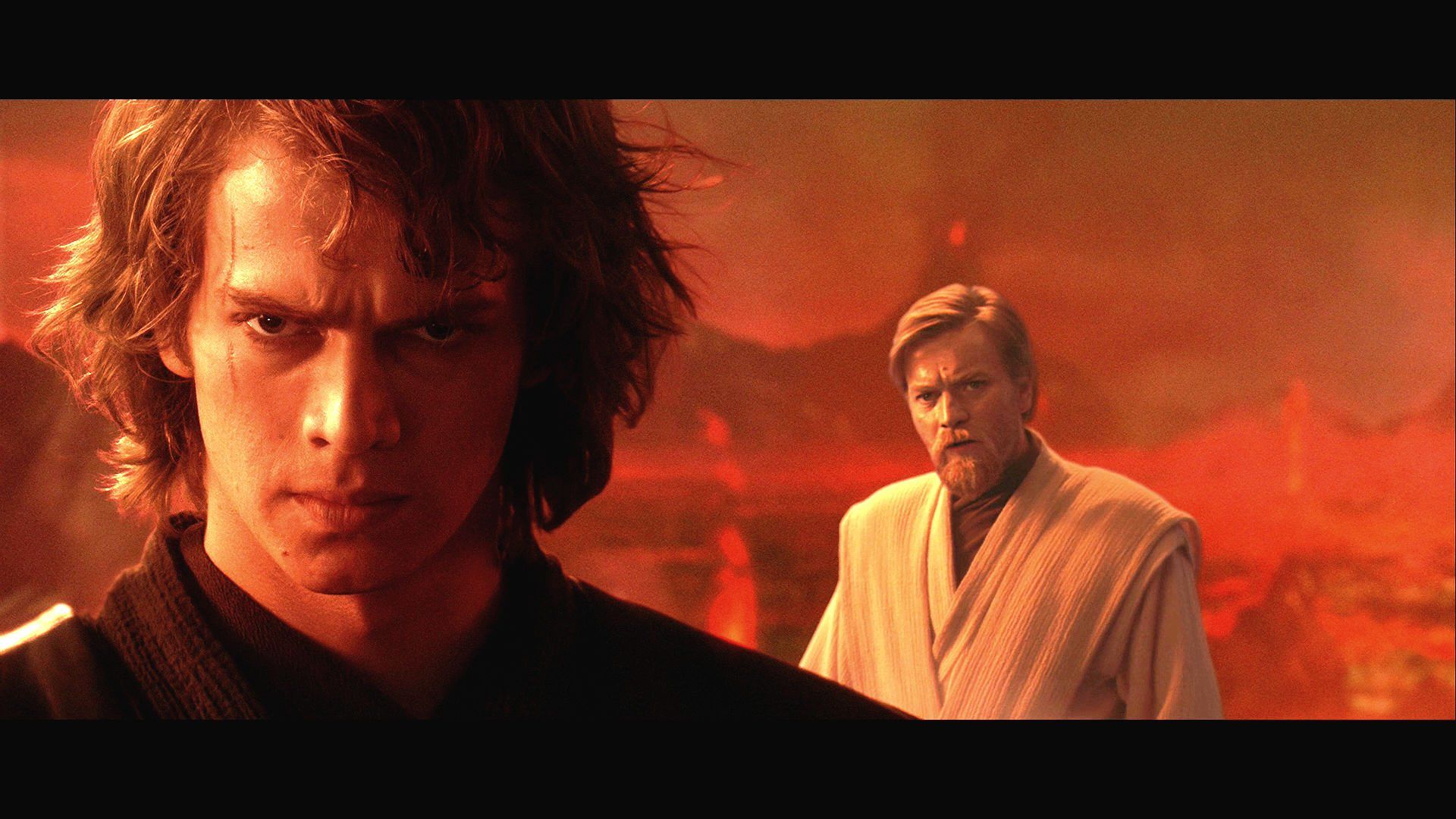
Obi-Wan’s horrified response, “Your new empire?! Anakin, my allegiance is to the Republic, to Democracy!” elicits from Anakin, “If you are not with me, then you are my enemy!” Anakin here exemplifies the false dichotomy of “us versus them” implicit in the line of reasoning underlying the downward spiral from paternalistic interventionist democracy to authoritative imperial tyranny: in a state of emergent crisis, any voice of dissent becomes rhetorically demonized as subversion, casting aspersions as to its allegiance, criminalizing all disagreement, further justifying institutional violence and increased state powers.
Anakin uses the Force to choke Padme out of a rage arising from the paranoid fear that she has chosen Obiwan Kenobi over him, a fear of loss stemming from the egoistic assumption that Anakin deserves Padme’s love and the egoistic desire to control circumstances beyond anyone’s reach like death or the feelings and choices of another. We kill what we love and wish to protect. Empires work much the same way. Those ruling empires do so out of egoistic assumptions of their own power and wisdom, working to control the lives of countless others according to their own standards and worldviews, willing to kill those who stand in the way or threaten their agendas.
It is interesting to note that Anakin does indeed love Padme. His love for her after his violent loss of his mother sparks uncontrollable fear of losing his wife. The quest to prevent her death rather than facing his fear by making peace with death’s inevitability eventually births the corruption, anger, and fear that erupts in the manslaughter of his wife much as many a dictatorship may truly love its nation and its people even as it ends up destroying them because of the consequences of using violence as a means of controlling the existential or political situation in the face of loss and fear. The fear of further attacks after 9/11 not only produced the endless wars of the War on Terror as a foreign policy for the U.S., but also the Patriot Act, perhaps the biggest threat to American democracy through its own domestic policy ever, single-handedly shredding the Constitution’s Bill of Rights as it empowers the federal government to remove due process and allow torture while also militarizing local police agencies.
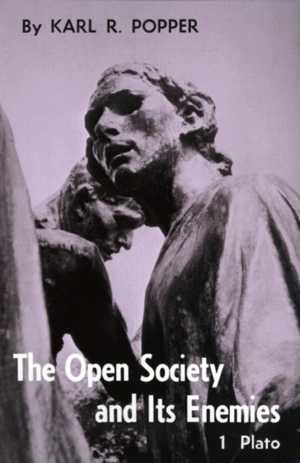
The galaxy’s Republic dies simultaneously with Amidala, the subsequent Empire born alongside Anakin’s transformation into the Sith Lord Darth Vader, an echo of Karl Popper’s charges in The Open Society 9 that Plato betrays his own ideals of justice. George Lucas’ preoccupation in the original Star Wars trilogy of the late seventies and eighties focused on an American role in global politics as the Cold War came to a close, just as his later prequel trilogy comes back to that same question right when America re-justifies its world police role in the wake of 9/11 through its War on Terror.
Americans’ angry frustration with the feeble bureaucratic strength of the United Nations after the loss of more than 3,600 civilians and its subsequent use of military violence on Afghanistan and Iraq manifests itself much like Anakin’s murderous rage visited on all of the men, women, and children of the Tusken Raider sand people of Tatooine who were responsible for the torturous murder of his mother in Star Wars Episode II- Attack of the Clones. According to Brown University’s Watson Institute for International and Public Affairs, “About 147,000 people have been killed in the Afghanistan war since 2001. More than 38,000 of those killed have been civilians” and “No one knows with certainty how many people have been killed and wounded in Iraq since the 2003 United States invasion. However, we know that over 182,000 civilians have died from direct war related violence caused by the US […] through November 2018.” Like the peace of mind for US citizens at home at the expense of a world abroad terrified by US drone assassination programs, military occupations, and the threat of nuclear strikes, Anakin’s and Palpatine’s Empire rests on the pillars of fear and might, forcing all star systems to fall into ranks by threatening them with the apocalyptic weapon the Death Star, a space station capable of destroying planets.
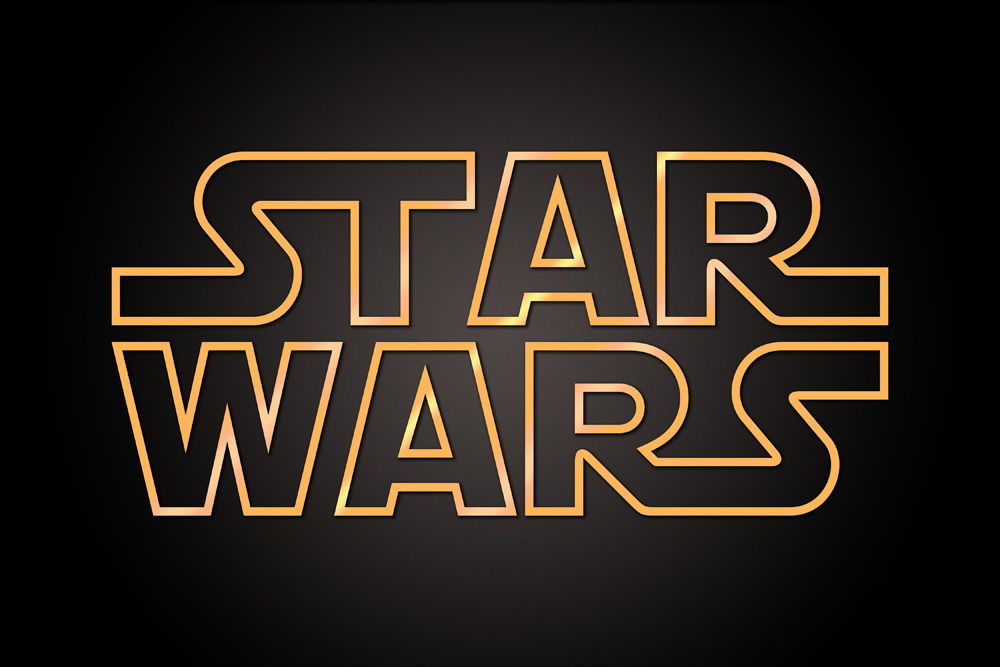
Even though the original trilogy (the 1970’s and 80’s Star Wars trilogy beginning with Star Wars Episode IV- A New Hope) chronicles the redemptive arc that destroys the Empire and restores a (New) Republic, this restoration costs the lives of millions, including featured characters like Obi Wan Kenobi, Darth Vader/Anakin Skywalker, Lars Owen and his wife, and many others. Further, this New Republic is presented as an unstable democracy rebuilt for a mere twenty years before being threatened by the newly emerging First Order and its cataclysmic Star-killer base in Star Wars Episode VII: The Force Awakens.
In the end, we discover in the Star Wars prequel series that Anakin Skywalker began his journey to become Darth Vader as an idealistic youth working towards order, peace, and stability for the democratic Republic he grew up in, that he sought more power out of a desire to protect those he loved, and that his gradual descent to the dark side of the Force symbolizes through science fiction cinema the corruption process Lord Acton of England described when he wrote in 1887, “Power tends to corrupt, and absolute power corrupts absolutely. Great men are almost always bad men.”
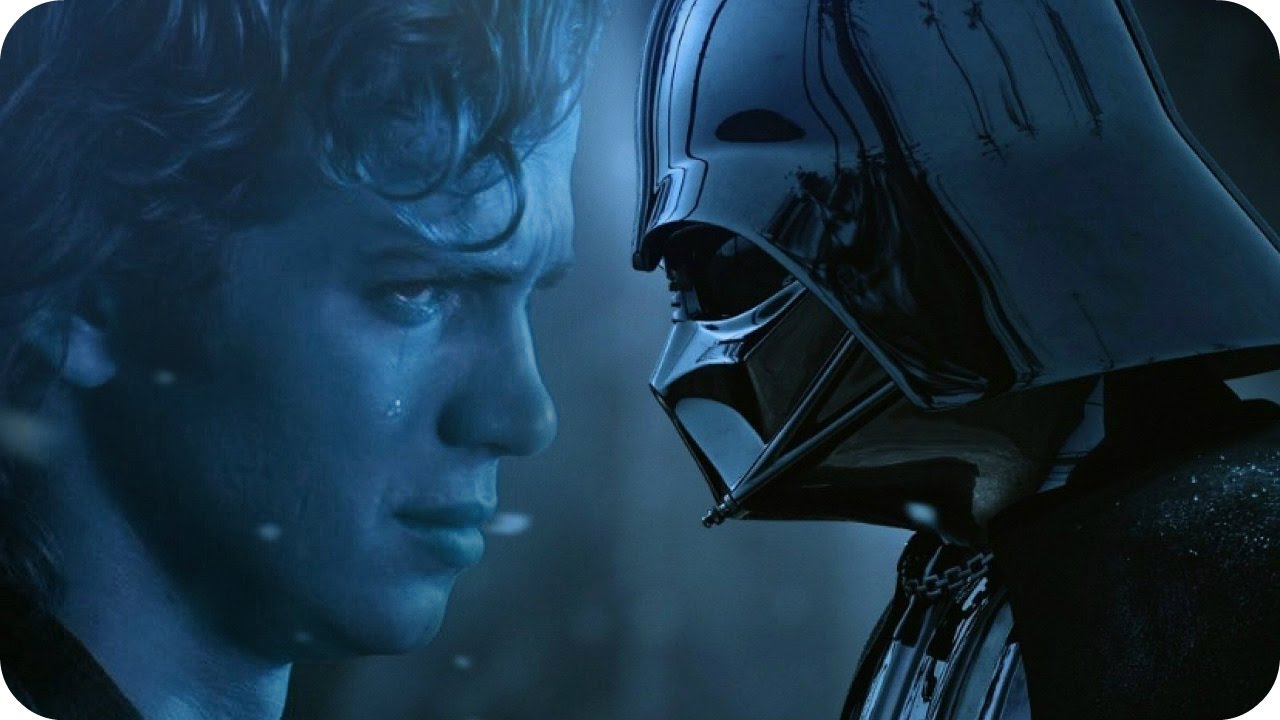
George Lucas’ admission that Darth Vader comes from Dutch and German for “dark father,” reveals that the transformation from Anakin Skywalker to Darth Vader parallels the corruption of empires that begin as paternalism but end up as abuses of power. The tragedy of the Star Wars series is the tragedy of every historical empire: the road to hell is paved with good intentions. Perhaps, not only should we be withdrawing from Syria, but also Iraq, Afghanistan, Saudi Arabia, and the more than 70 countries around the world in which the U.S. keeps its military bases as footholds to U.S. military presence, “gentle reminders” of U.S. imperial agendas and its corporate interests.
Works Cited
- Mill, John Stuart. On Liberty. New York: Cambridge University Press, 2013. Print. ↩
- Choi, Seung-Whan and James, Patrick. “Why Does the United States Intervene Abroad? Democracy, Human Rights Violations, and Terrorism.” Journal of Conflict Resolution. vol. 60, no. 5, 2016, pp. 899–926. JSTOR. doi:10.1177/0022002714560350 ↩
- Wolpert, Andrew. Remembering Defeat: Civil War and Civic Memory in Ancient Athens. Baltimore: John Hopkins UP. 2001. Print. ↩
- Mark, Joshua J. “Roman Empire.” Ancient History Encyclopedia. Ancient History Encyclopedia, 22 Mar 2018. Web. 16 Oct 2019. ↩
- “How Did the Nazi Consolidate Their Power?” The Holocaust Explained: Designed for Schools. The Wiener Holocaust Library, The London Jewish Cultural Centre, www.theholocaustexplained.org/the-nazi-rise-to-power/how-did-the-nazi-gain-power/themes-of-nazi-consolidation/ ↩
- Alsayyad, Nezar. “The Cinematic City: Between Modernist Utopia and Postmodernist Dystopia.” Built Environment (1978-), vol. 26, no. 4, 2000, pp. 268–281. JSTOR, www.jstor.org/stable/23287791. ↩
- Miller, Arthur. The Crucible. New York: Bantam Books, 1959. ↩
- Plato. The Republic. Trans. Richard W. Sterling and William C. Scott. New York, London: W.W. Norton & Company Inc. 1985. Print. ↩
- Popper, Karl R. The Open Society and its Enemies. Princeton: Princeton UP, 2013. Print. ↩
What do you think? Leave a comment.











Very enjoyable read with great references to philosophical ideals. I am not a huge fan of the prequels but this article gives me cause to revisit them.
I have to ask though: Is there a way to avoid Paternalism when you are among at the top of the food chain? Can you be paternalistic yet not an abuser of power?
Thank you- I’m glad you enjoyed it! Your question is the inevitable question yet one that lies beyond the bounds of this piece. Within the SW universe it seems the answer is an Ancient Greek one: hubris follows reaching the top. And our own history seems to confirm this: Alexander of Macedonia, Rome, the Mexica (Aztecs), Spain, Britain, the US, Soviets. Every ruling empire commits atrocitties
Thanks for the response! I wonder if the SW universe can ever offer a “solution” to paternalism or “break the cycle”. But it seems that the newer movies do not really attempt to do it, choosing instead to repeat the cycle.
I’ve always found it very revealing that Star Wars’ tagline is ‘A long time ago in a galaxy far, far away’ – from which we can infer that humans have yet to learn from our collective, ages old failures. We repeat the same mistakes and always find excuses to continue with the same mindset.
The politics of the prequels was probably one of my favorite aspects of the trilogy.
I absolutely love this! I’m always looking for more ways to explain how intellectually dense The Phantom Menace truly is…
Palpatine has always been pitting the good and bad guys against each other.
Let’s not also forget that in the classical trilogy there were political elements too. One of these is how superior numbers, firepower, er even technology in general does not guarantee victory. Having a massive empire, especially one that spans the galaxy, is quite the logistical nightmare. You need more manpower to secure more space, but then this requires more supply lines and more resources which requires even MORE manpower to secure that. And on top of that you can only push people so far before they start to push back. This is what allowed the rebels to have the edge. They often attacked the supply lines which were hardest to defend, causing the imperial fleet to be just as useless as if it were destroyed. They used just enough resources to attack these weak points, collected more resources on the move thereby eliminating the need for supply lines, and hid in the vastness of space. As an added bonus, some of the locals were sympathetic to the alliance cause, which at first helped somewhat but grew and grew over time.
Good point! And if you look at Kim Payne’s comment next to yours – the irony becomes evident: the Rebels pretty much turn some of these tactics Palpatine used against the Republic against his own Empire.
I loved the politics we got to see in the Prequels. They added so much depth and lore to the universe. Palpatine’s plan is genius when you take a step back and look at the big picture:
-The Sith have been plotting their revenge against the Jedi Order and Republic for centuries
-It all begins with a Sith lord uniting an anti-Republic coalition, the Confederacy of Independent Systems
-Palpatine orchestrates a crisis on Naboo, which draws the Republic into conflict against the CIS and gains him the rank of Chancellor in the Galactic Republic
-War is brewing, and the Republic is pushed to do something
-The Republic discovers a secret army, and has no choice but to use it against the CIS
-The Jedi Order becomes tangled up in the war
-Galactic Republic is stretched thin, public outcry over the war grows louder
-Palpatine corrupts the golden Jedi (Anakin), and uses him as a pawn
-Palpatine uses the GAR against the Jedi, who were forced into the conflict, wiping them out
-Palpatine uses emergency wartime powers and a power vacuum to turn the Galactic Republic into the Galactic Empire
The Galactic Republic, the CIS, and the Jedi were all pawns in a massive plan orchestrated by Palpatine. I don’t know about anyone else here, but I adore this story and think it gives a sense of tragedy and really makes the Sith’s plan impressive.
Awesome bullet point summation of Palpatine’s conspiracy. And if you look at sindy’s comment next to yours – the irony becomes evident: the Rebels pretty much turn some of the tactics Palpatine used against the Republic against his own Empire
My main issue with the prequels is that I’ve probably watched them dozens of times over the years, and your post makes far more sense than they ever have. The movies are executed so poorly we just see a guy stand in front of the Senate, who now suddenly looks completely different, claim to have killed the entire police force (including children) because they attempted to kill him (offers no proof), and the Senate names him Emperor of the galaxy just because. In fact, they seem thrilled about it.
That’s not even the first time the senate knee-jerks to do whatever Palpatine wants just because. He’s named chancellor in the first place basically just out of “sympathy vote” for his planet? I feel like thousands of other planets would be willing to do whatever they fucking can to get someone from their homeworld the chancellorship. But we don’t see any of that, Palpatine just walks into the room and says to the audience that he’ll be the new chancellor.
I’m sure someone could tear apart my arguments, with citations, but like I’ve said, I’ve seen these movies dozens of times. This is pretty much how they come off imo.
You should check out the canon novel Bloodline. Pretty much a political thriller set in the SW galaxy.
I will! Thanks for the suggestion!
Fascinating piece. Do more about star wars politics.
I just realized that Palpatine reminds me of someone…
Who? Name names : )
George Lucas certainly knew what he was doing when he wrote the political scenes in Star Wars. Too bad many sheep in our Country don’t even realize the lesson he was trying to teach everyone.
All it shows is that a democracy or republic is Still just a evil empire, PRETENDING that voting or senators control anything……And that people in positions of wealth and power Didn’t Earn it, they just were given their positions in order to blindly support and promote the government and LIE about this corruption to trick people and what they think….
Democracy is a lie.
There’s a good deleted scene in Attack of the Clones that illustrates how caught up in warmongering the Senate got and how easy it was for Palpatine to play them. People have to think with their heads more than their emotions.
I think that if we ever lose our freedoms and democracy it would be just like how Padme said, with thunderous applause. There are many people willing to give up their liberties for a perceived safe space. The Second Amendment is bad because guns kill people and the First Amendment allows for racism and bigotry. Therefore both must be censored and restricted to the point they no longer exist. All the politicians have to do is convince the masses that they will benefit from it, be safer, and the masses will beg them to take away their freedoms. I used to think the only way we would lose our freedoms is if a country like Nazi Germany or Communist Russia took us over. But anymore I think the most likely way is for people, those ignorant masses brainwashed by the media, to vote to allow the government to take away our liberties. And then those people will make a thunderous applause.
People who say how there was too much politics in the prequels make me laugh. Those scenes in TPM showing the brilliance of Palpatine’s manipulative nature. Where he got emergency powers through making a representative feeling like he should ‘do the right thing’ in AOTC. When the culmination of all his political manipulation came to fruition in ROTS and he declared the Galactic Empire.
The politics were showing us how disfunctional the Senate was and how fucking incredible Palpatine was at being, well, himself. How else do people expect to see the rise of a galactic empire without seeing the politics of it?! If there weren’t any such scenes, you can bet that those same people would be disappointed that we didn’t see how the empire rose.
I think a good number of the people who complain about there being “too much politics” in the prequels are the people who just parrot the popular things people bring up when hating on the prequels.
The problem with the politics in the prequels is that they make no sense.
In the OT, the politics are “fascist government toppled the Republic and some folks rebel against that.” Boom.
In the prequels, nothing makes sense.
* Why is a corporation blockading a planet over trade disputes? Don’t they want more trade, not less? What do they get out of it? How does this solve the fact that trade routes are over taxed?
* Why is a 14 year old elected queen? Seriously, not something any democracy would do (no comment about our current president)
* Why would a bunch of corporations band together to form a Separatist army and separate from the Republic? Again, corporations want to make profit. They do not want to pay for wars
* If Naboo is a way to get Palpatine elected chancellor, why does he try to have the Jedi killed and then try to make the invasion legal? The goal should be to launch the invasion and send the Jedi back to the Republic to tell them to screw off. Boom, crisis.
* How are the Naboo dying without space trade? Where are the dying Nabooians? Come to think of it, where are any of the Nabooians?
* Why is Jar Jar a senator and why is anyone so easily baited into giving Palpatine emergency powers?
* How can Yoda deploy an army of Republic soldiers with no oversight from the Senate and start a galactic war? How does he have that authority?
* Seriously, no one goes “Uh, why did this guy have all of the military leadership murdered without consulting the Senate first?” No one says anything when it’s like “We are gonna be an Empire now and I’m always gonna be in power.”
I could go on and on.
I will say that the Plagueis novel made this whole situation make more sense and added enough detail to make it actually coherent. They conspire to screw the Outer Rim systems so they are angry at the Core, which makes Dooku seem more appealing.
The films should have started with Attack of the Clones, Palpatine should have already been Chancellor, Anakin should already be a Jedi, and the war should have been underway. This would give enough time for Anakin to convincingly fall to the dark side. The villains can be the Separatists who were mistreated by the Republic and left. No need to discuss the taxation of trade routes or whatever.
@poopoo (love the handle btw):
* Why is a corporation blockading a planet over trade disputes? Don’t they want more trade, not less? What do they get out of it? How does this solve the fact that trade routes are over taxed?- Look at American corporate intervention in countries that present obstacles to “free trade” like theocratic Muslim countries (Iran) or socialist democratic countries (Venezuela) or totalitarian communist countries (Cuba). In all cases, the US puts military, political, and economic (embargoes) pressure on those countries out of primarily corporate interest/agenda
* Why is a 14 year old elected queen? Seriously, not something any democracy would do (no comment about our current president)- Agreed, but it’s not out of the realm of possibility, look at the political steam Greta Thunberg is generating. Then again, I’m sure constitutions would have age requirements for key positions of power
* Why would a bunch of corporations band together to form a Separatist army and separate from the Republic? Again, corporations want to make profit. They do not want to pay for wars.- War is THE most profitable business of all. It has provided the primary foundation of the US economy ever since slavery was abolished after the Civil War
* If Naboo is a way to get Palpatine elected chancellor, why does he try to have the Jedi killed and then try to make the invasion legal? The goal should be to launch the invasion and send the Jedi back to the Republic to tell them to screw off. Boom, crisis.- The idea is not to reveal his poker hand too early so as to catch the Jedi off guard with Order 66.
* How are the Naboo dying without space trade? Where are the dying Nabooians? Come to think of it, where are any of the Nabooians?- Fair point. Movies could have used some “average joe on the streets suffering shots”
* Why is Jar Jar a senator and why is anyone so easily baited into giving Palpatine emergency powers?- Why does Jar Jar exist at all? and Because it’s Jar Jar (JK). The US was baited into agreeing to the Patriot Act and the NDAA (National Defense Authorization Act) for 17 years consecutively based off 9/11, seems like a pretty easy bait for emergency powers
* How can Yoda deploy an army of Republic soldiers with no oversight from the Senate and start a galactic war? How does he have that authority?- How many international conflicts has the US begun without Congressional oversight?
* Seriously, no one goes “Uh, why did this guy have all of the military leadership murdered without consulting the Senate first?” No one says anything when it’s like “We are gonna be an Empire now and I’m always gonna be in power.”- No one says it but here we are all the same (see US since the Cold War)
I will say that the Plagueis novel made this whole situation make more sense and added enough detail to make it actually coherent. They conspire to screw the Outer Rim systems so they are angry at the Core, which makes Dooku seem more appealing.- My answer: agreed
The films should have started with Attack of the Clones, Palpatine should have already been Chancellor, Anakin should already be a Jedi, and the war should have been underway. This would give enough time for Anakin to convincingly fall to the dark side. The villains can be the Separatists who were mistreated by the Republic and left. No need to discuss the taxation of trade routes or whatever. – I like this idea! I’d buy that for a dollar.
Thanks for playing!
Its really simple, palpatine is ordering shots on both sides, orchestrating everything. Thats why things don’t make sense superficially, palpatine ordered the trade federation to block trade on naboo his own planet so he could go to the Senate and gain power becoming chancellor. Palpatine is on both sides of every political aspect of the prequels. In the clone wars he controls the droid armies as sideous and the clone armies as palpatine. He is behind everything gaining power at every move.
Yes Hahn! Absolutely! In gambling and game theory it’s referred to as hedging your bets, you invest in all competitors so that no matter who wins you do as well. Corporations contribute to both political parties in the US. The US funded both Iran and Iraq during their ten years of war. It’s an old tried and true method of establishing hegemony.
I think the time period when the films were written (late 1990s to early 2000s) strongly informed the construction of the narrative and transition from republic to empire.
Great article! Very interesting!
As I’ve grown older and become interested in real world politics, I began to like the politics in the Prequels, and after viewing them with that mindset I can’t really see how politics couldn’t have been featured. After all, that’s how Palpatine acquired his ultimate power. I also think watching The Clone Wars helped as well. There are episodes heavily focused around the Senate and the challenges Padmé and Bail Organa have.
I’m ashamed to say I was very, very against the clone wars when it came out because I had an irrational hate of the art style. It’s still not exactly my favorite art style, but I’m loving the deeper look into a huge conflict that’s kinda glossed over in the movies.
The PT is a bunch of good idea wrapped in some pretty poor execution.
I’ve never understood why the conventional battles in star wars weren’t fought with millions of ships and billions if not trillions of individual soldiers. Like, an entire Galaxy would have a population in the 10^25 range, if not more. Like, only Warhammer ever really gives the scale of these conflicts any thought. Truly, individual lives should be meaningless. The construction of a death star should be no harder than making a paperclip for a K3 civilization. The sky should be dark with Dyson swarms and Droid should be manufacturing of Droids should be measured in the trillions/hour.
That’s what makes using star wars as an anologue difficult. I love it as a story and it works, but the scale is, at best, international. I understand why, but it conflicts with the power of the empire and a galaxy, really.
No lies detected here Candice. Would make for a good article- you could explain the scale of population and technological advancement along the Kardashev scale then assess SW and other space operas.
This article is both simple and genius, I loved it!
I love it
Even as a kid I liked the politics of the prequels, there were none in the OT cuz emperor palpating wiped out the senate during episode 4
It is great to see your analysis. I always felt that Star Wars fed into the 70s boy generation narrative that were disappointed in their fathers and their examples of oppressive parenthood. Your article went further to look at paternalistic systems.
Not having a central military made sense during the 1000 year peace of the Republic that had no serious threats to it’s rule.
A good essay, interesting analogy between Star Wars and democracy. John Stuart Mill reference is insightful. Is democracy always seen as so fragile? Maybe, maybe not. Certainly in the case of Donald Trump, he, as well as perhaps many of his supporters, are frustrated that they are not able to get everything that they want–exactly what all that is, is not entirely clear. That frustration is one way of looking at the resilience of an American democracy.
The fragility of democracy goes well beyond Trump however. Bush and Obama and Clinton have eroded our democratic ideals and human rights through the Patriot Act, the National Defense Authorization Act, $750 bn a year in military weapons spending, drone assassinations, executive orders to bypass the Constitution, Wall Street bail outs and tax cuts, etc.
Very interesting take on this topic. Really enjoyed the comparisons to philosophical ideas and the past informing the media of today. Some great examples and references to support your ideas.
It would be interesting to produce a follow up after The Rise of Skywalker to see how the new trilogy ends and if it reflects modern ideals as well. It would be somewhat different considering it isn’t George Lucas and the inspirations may not be the same but still intriguing to think about.
Thank you Anthony, I’m happy you liked the read. To be honest, I’m having a hard time seeing much beyond toxic masculinity in the sequel trilogy. It could be because they’ve been winging it in the new series much as they did in the original trilogy, whereas the prequels were under Lucas’ singular creative direction throughout. It could also be that I don’t have enough distance yet to fully appreciate what the sequels are offering. Only time will tell.
This was a very entertaining and enlightening read. While many tend to decry the prequels, I always found the subtle politics involved in the prequel trilogy to be of great significance. The Clone Wars series strengthened the discussions presented in your article even more. The question now becomes that while the US withdrawal is a relevant necessity, what would the consequences of such a decision be especially when there are disputed reports that the withdrawal of such forces have also met with further aggression and casualties in these areas of dispute, what can be done to facilitate the re-establishment of a government?
I’m glad you enjoyed the read. As for the consequences of withdrawal, destabilization is already the consequence of US involvement to begin with. In the end, any concern for foreign countries justifies US imperial violence for private interests, that’s how we got into this situation in the first place- the war hawks rely on liberal compassion for foreign suffering and corporate media helps to foster it.
The tension between individual freedom and a human desire to be kept safe is a never-ending one. But even Plato’s desire to have the wisest decide for all society can only lead to tyranny. Democracy is messy and chaotic and often feels like there’s never a satisfactory (or finite) answer. But what’s the alternative? To have a fallible human being decide for us and, in the end, consolidate that authority by turning to the Dark Side?
Yes! Exactly Spinelli! However, the prequels seem to suggest democracy is not only messy, it is inevitably conducive of tyranny. A conclusion Plato wholeheartedly agrees with as Books VII and VIIII of the Republic map out the same exact descent from democracy to tyranny- a topic I plan to expand on in the next installment.
Such a great topic to explore and done in such depth! Would love to know your thoughts on the latest film.
I’d say I agree with much of the internet: it retcons some of TLJ, a lot of fan service, it would have benefited from being broken up into two parts since it ended up rushing to tie up too many threads in underdeveloped ways, no real surprises, too many deus ex machinas and plot holes, and so on
However, let’s see how it ages.
Being an avid Trekkie, I must admit I did find the article and references discussed interesting. Great work!
Thank you! I love me some Star Trek too, don’t get me wrong. I find it interesting that Roddenberry’s utopianism has devolved into the more mainstream dystopian and cataclysmic narratives under Paramount+.
This is a fascinating reading of the Star Wars saga, particularly the prequels. I think that the paternalism argument can even be extended beyond the Empire to the Jedi themselves, who in many ways straddle the fine line between paternalism and human rights intervention as “peacekeepers.” This is a central issue throughout The Clone Wars series, where it becomes clear that Sidious’ plot to defeat the Jedi was grounded in turning the people against them for continuing a war across the galaxy. The Jedi are essentially the US in this analogy, defending freedom and democracy across the world but spreading violence and sowing dissent all the while. The Clone Wars arguably stands for the idea that the Jedi’s downfall stems from their paternalism, which clouded their perception with arrogance and pushed away the likes of Ahsoka and Anakin from the Jedi Order.
Absolutely, yes I agree. The Jedi represent the U.S.’s more idealistic eutopian paternalism and their gradually increasing reliance on the clone troopers sets up their downfall and the Empire just as US foreign policy devolved from the benevolent defenders of democracy in WWI to the perpetual occupying force and drone based state terror of its War on Terror in the 21st century.